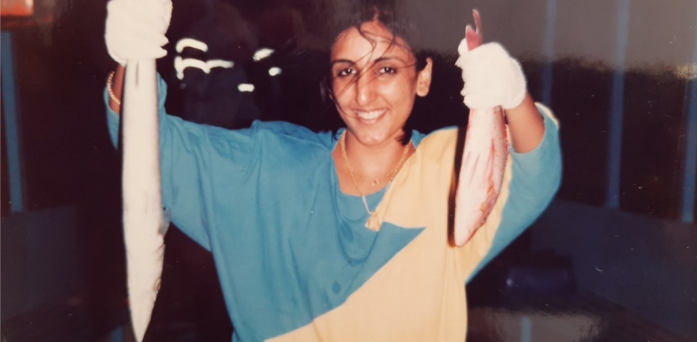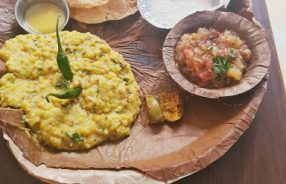A Coup d’etat and Fish Cakes
The year was 1988. Fresh out of college and six months to go for further education. I jumped at a plan to visit my sister who lived in Male, the capital city in the Maldives. The Maldives is a group of about 1200 coral islands, and part of the same archipelago as the Lakshadweep. It is a beautiful country with pristine white sand and every conceivable shade of blue in its waters.


Back in 1988, Maldives was hardly known as it is today. For someone who lived landlocked all their lives, not venturing south of the Vindhyas, the colors of the Indian Ocean were mesmerizing as the plane started its descent. Remember Indian Airlines? One had to take three connecting flights from India to arrive in the Maldives!
Malé, which had a population of less than 60,000, was dotted with small houses, most with a coconut tree (Kurumba in Divehi) or two. Residents took on the names of the houses they lived in. During my walks, I was acknowledged with a nod and as “Kamini Ge” (the name of the house where my sister lived), followed by “same design”. I later learned that this phrase referred to the family resemblance between my sister and me. The first few days had me spellbound by the natural beauty and sense of safety one felt on the island. Doors were never locked; windows had no bars and every balcony door was kept wide open in the night to let the breeze in.
One morning, a little before sunrise, I woke up to the sound of crackers. As I rushed out to catch the action, I realized that this was no celebration but the sound of gunshots. In the ensuing melee, there were raised voices, cries for help, and fleeing figures. I was present and witness to the attempted coup to overthrow President Abdul Gayoom. A handful of mercenaries hired from Sri Lanka by a powerful Maldivian businessman ended with 19 Maldivians dead in the unsuccessful coup. India was one of the first respondents to help the nation repel the threat. A few days later, I was invited to high tea by the wife of the Minister of Travel and Industry, along with a few other Indians. My sister, having recently opened the only formal dining restaurant was busy with a banquet that evening, decided that I would be the one to represent her family. I was sent for the high tea with no preamble, no idea of what to expect.
Cut back to my upbringing. Raised in Kanpur in a vegetarian household, my idea of non-vegetarian food was limited to pizzas at Nirula’s and chicken chaat at Kwality restaurant. I was a greenhorn in the world of fish, other than being exposed to the fish fingers served at the Cawnpore Club!
Back to the high-tea: The guests were all women. We were ushered into a simple home with a large table against a wall, covered in a plastic flower-print. Arrayed on the table were a few dishes that looked like bhajjis to my unsuspecting eye. After a few minutes of polite conversation, I took a cue from the other guests and served myself. Maldives is home to the finest varieties of tuna in the world. I learned that all the snacks served were fish in various forms – cooked, shredded, spiced, patted, fried. It was the most trying journey that my 20-year-old palate had ever undertaken. Torn between keeping it down and spitting it out, I managed to find the way to the washroom on more than one occasion. After getting the “eye” from a guest, I devised ways of concealing large bits of “tea” in my napkin. Eagerly waiting for the cake, which everyone was discussing, I hoped to change the fishy taste that lingered before I left. Yes, you would have guessed by now that the cake was no dessert but the fish cake, a well-known delicacy called Masgudha in Divehi. The palate has known no greater terror than that day in the Maldives! I plotted ways to take revenge on my sister who had a good laugh when she heard about my experience from other members of the community who were present at the high tea.

It took many years, nay, decades and living in Chennai that made me enjoy fish. As an ode to my late sister and a Maldivian sojourn, I am sharing the recipe of a Maldivian fish curry (also in the recipe section of this blog: https://elsatable.com/recipe/riha-roshi/) which has subsequently become a favorite. Riha in Divehi is fish and roshi is their version of soft-melt-in-the-mouth-rotis. Maldivian cooking has elements from both India and Sri Lanka. Made with Tuna and unripe mangoes, it is easy to make and delicious. Such a long Journey as Rohinton Mistry would say!





